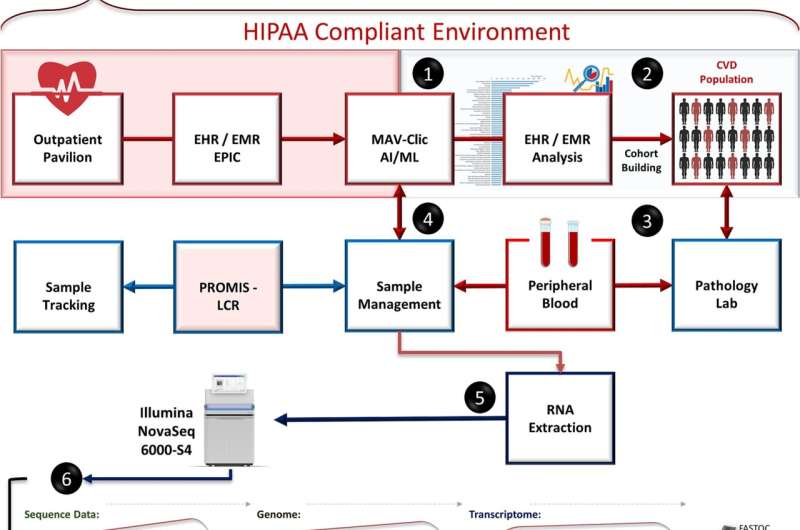This article has been reviewed according to Science X's editorial process and policies. Editors have highlighted the following attributes while ensuring the content's credibility:
fact-checked
trusted source
proofread
Researchers use artificial intelligence to predict cardiovascular disease

Researchers may be able to predict cardiovascular disease—such as arterial fibrillation and heart failure—in patients by using artificial intelligence (AI) to examine the genes in their DNA, according to a new Rutgers study.
"With the successful execution of our model, we predicted the association of highly significant cardiovascular disease genes tied to demographic variables like race, gender and age," said Zeeshan Ahmed, a core faculty member at the Rutgers Institute for Health, Health Care Policy and Aging Research (IFH) and lead author of the study, published in Genomics.
According to the World Health Organization, cardiovascular disease is the leading cause of death globally, yet it is estimated that more than 75 percent of premature cardiovascular disease is preventable. Atrial fibrillation and heart failure contribute to about 45 percent of all cardiovascular disease deaths.
Despite significant advancements in cardiovascular disease diagnostics, prevention and treatment, about half of the affected patients reportedly die within five years of receiving a diagnosis because of a variety of reasons. including genetic and environmental factors. Researchers said the use of AI and machine learning can accelerate our ability to identify genes that have important implications for cardiovascular disease, which can lead to improvements in diagnoses and treatment.
Researchers from IFH analyzed healthy patients and patients diagnosed with cardiovascular disease and used AI and machine-learning models to investigate the genes known to be associated with the most common manifestations of cardiovascular disease, including atrial fibrillation and heart failure.
They identified a group of genes that were significantly associated with having cardiovascular disease. Researchers also found significant differences among race, gender and age factors based on the cardiovascular disease. While age and gender factors correlated to heart failure, age and race factors correlated to atrial fibrillation. For example, in the patients examined, the older the patient, the more likely they were to have a cardiovascular disease.
"Timely understanding and precise treatment of cardiovascular disease will ultimately benefit millions of individuals by reducing the high risk for mortality and improving the quality of life," said Ahmed, who is an assistant professor with the Department of Medicine at Rutgers Robert Wood Johnson Medical School.
Researchers said future research should extend this approach by analyzing the full set of genes in patients with cardiovascular disease which may reveal important biomarkers and risk factors associated with the cardiovascular disease susceptibility.
Co-authors of the study include Vignesh Venkat, Habiba Abdelhalim and William DeGroat of IFH and Saman Zeeshan of Rutgers Cancer Institute of New Jersey.
More information: Vignesh Venkat et al, Investigating genes associated with heart failure, atrial fibrillation, and other cardiovascular diseases, and predicting disease using machine learning techniques for translational research and precision medicine, Genomics (2023). DOI: 10.1016/j.ygeno.2023.110584




















